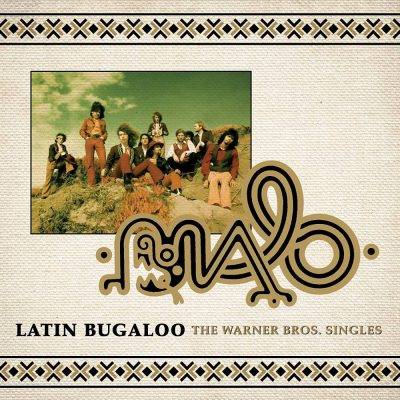Malo Latin Bugaloo
Malo
Latin Bugaloo: The Warner Brothers Singles
Omnivore
When most people think of Latin blues-based Bay Area bands, Santana is almost always the first one mentioned. That Santana is the surname for band leader Carlos Santana but his younger brother, band leader Jorge Santana, led an equally impressive group in the Bay Area, the horn-infused rock/blues/jazz ensemble Malo. Like other California bands War and Tower of Power, their defining sound was horns, but unlike those bands, their Latin and African percussion gave them a unique identity. Omnivore Records has comprised all 14 A and B sides on Latin Bugaloo: The Warner Brothers Singles for the first time.
Jorge Santana calls Malo pretty much a jam band but their natural energy required structured arrangements. On albums many of their cuts could stretch to the near 10-minute mark, so all the tracks selected here were edited for the format. This was the way they were originally heard on the radio. The ten piece group released their debut album in 1972. That self-titled album featured percussion legends Victor Pantjoja and Coke Escovedo, keyboardist Ricard Kermode, and Luis Gasca on trumpet. Most of the writing was done not by Santana but by core members Zarate, Garcia and Tellez from the group’s original incarnation, The Malibus. The breakout single from the album and the first track here was “Suavecito.” The flip side, “Nena” as well as two others (“Café,” “Peace”) from the first album appear as the first four tracks.
By 1972 and the second album Dos four members had departed, new ones joined, and the horns and percussion took on even greater prominence. Santana says the band was overtly going for a Chicago/Blood Sweat & Tears kind of sound. Tracks 4-10 are from that album, including the title track. Jorge traces much of the success of Dos to the arrangements of keyboardist Richard Kermode who left for Carlos’ band after the album’s release. Interestingly Jorge says the band did not operate under the shadow of his older brother’s group. “it did open the door for us, that last name. But the band continued on its own path without much association with Carlos. The early bios always mentioned that I was made the leader of the band, and that I am the brother of Carlos Santana. But that was the extent of it, not too much was taken up to compare us beyond that.”
From there the band went on to release two more albums, with continued personnel shifts, moving more directly into jazz fusion, influenced by what Miles Davis, Chick Corea, and other bands were doing in the 1973-74 period. The only two that appear from 1973’s Evolution are “Merengue,” written by jazz guitarist Clarence ‘Sonny’ Henry, (who also wrote “Evil Ways”) and a cover of Willie Bobo’s “I Don’t Know.” Sales began to wane with Evolution and its next year follow-up Ascencion, to which some have attributed the label’s lack of marketing. Hence, even though Malo felt they had three great potential singles, only “Love Will Survive’ and the B-side “Think About Love” were released, appearing here as the last two tracks.
Malo disbanded in 1974. Jorge had a successful solo career and band members joined together under the Malo name subsequently, but these recordings represent the highlights of Malo’s most productive era. It’s a band that was bursting with so much unbridled energy and talent but in retrospect was perhaps too young to realize how blessed they were. Nonetheless, they left an enduring legacy that Omnivore has brought to life.
- Jim Hynes
[amazon_link asins=’B07BZ5F6SM,B07CPMYZLW,B000001OXX,B0012FB2IQ,B003A987R6,B003A92YF2′ template=’ProductCarousel’ store=’maasc-20′ marketplace=’US’ link_id=’5e06b2ca-5c4b-11e8-9080-053b63bb6e0a’]
Discover more from Making A Scene!
Subscribe to get the latest posts sent to your email.
















































